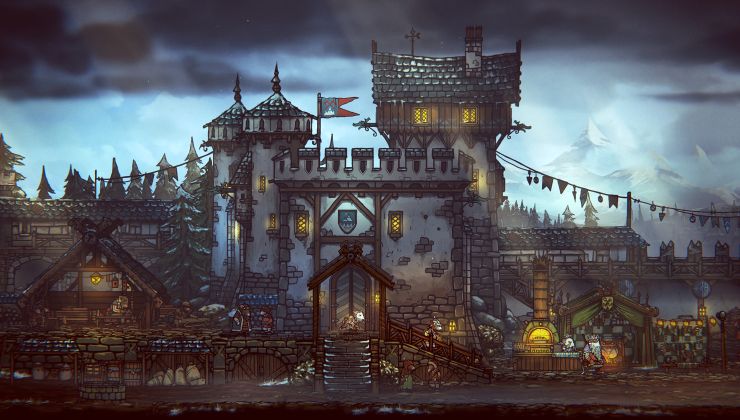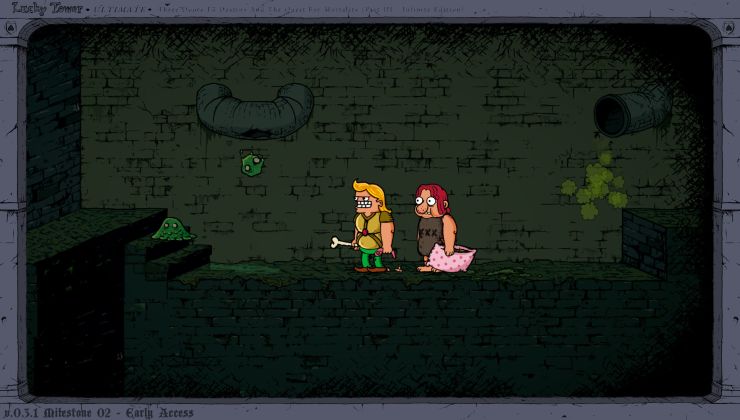Thanks to a Twitter tip, I've watched over the video of id Software talking about Doom, Vulkan, Linux and Google's Stadia and it's really quite interesting. For those who don't know what Stadia is, you can see this previous article. In short, it's Google's game streaming platform powered by Linux and Vulkan.
The thing is, id Software actually talked about having a Linux version of DOOM back at GDC last year that was never released, at least now we know why.
You can see the video below, it's currently an unlisted on YouTube and towards the end it does have some footage of the new DOOM Eternal. Some quick thoughts and info below if you can't watch it.

Direct Link
They go over lots of technical details, which I'm sure some of our readers here will appreciate.
I did particularly enjoy the "Why Linux?" slide with an answer of "It's not Windows" which seemed to give the crowd (and me) a little chuckle. The developer then also touched on how Linux outside of servers has been largely ignored, with a joke of articles talking about how "Linux gaming doesn't suck now, very convincing…and even that small portion is subdivided along different distributions, so it's really no wonder that no one pays attention to poor Linux".
I won't get into a long debate about how Linux gaming doesn't actually suck, but I will most likely be preaching to the choir. Linux gaming certainly isn't perfect but it doesn't suck and that's about as far as I want to get into that directly right now. It's also a shame that multiple distributions is still a hassle and common problem for developers. Anyway…
As for the software stack on Stadia, that was also talked about. Apart from the game and Google's own "libGGP" everything else seems open. It's using Pulse Audio, Vulkan, libc++, glibc and of course the Linux Kernel. They're doing this in the hopes it speeds up adoption, since getting a game onto Stadia would involve prototyping it on a normal Linux distribution like Ubuntu (which is what id Software did) and then you're mostly done by the looks of it.
As for their own software, for idTech7 their latest game engine, they said "everything uses Vulkan now and by that I do mean everything—the engine, idStudio, even our helper tools". At least for future games released normally, they should perform well when using Steam Play.
I'm still torn on Stadia for the reasons I gave before. I personally still consider Stadia to be Linux gaming, to me basically anything done on a Linux box is Linux gaming. After all, if I'm playing on my Ubuntu PC, with Stadia which is also powered by Linux, what about that isn't Linux gaming? I'm sure some of you will have interesting answers to that in the comments (and feel free to debate it—politely please!).
However, there's tons of issues it has to overcome for me. There's a lack of ownership of the games so they could be taken away at any time, latency which even people checking out the demo at GDC this year said was an issue (PC Gamer: "latency is clearly present", "the delayed input to screen loop is very noticeable" and so on - many others said the same and worse), likely no modding support, massive bandwidth use and so on.
What are you current thoughts on Stadia streaming platform? Will you be using it?
It was somewhat easier for iD seeing as they already had Vulkan as a core engine target. It took, what, 3 weeks to get an initial Stadia test working? It took less to get a desktop GNU/Linux version working - but again, core engine support for much of it was already there (because of headless server support). So iD are perhaps an exception in ease of porting - not everyone else will have such an easy time of it if their code base is more Windows-centric.Keep in mind the vast majority of developers are using things like Unity and Unreal though, both have Vulkan support which is gradually getting into a better state. Both engines announced support for Stadia too...
Awesome news!
Re: Stadia
At&t DSL @ 600kb/s = Stadia? What stadia? And Google, being Google, can be expected to drop the whole thing in a few years anyway.
Last edited by Nanobang on 14 May 2019 at 12:07 pm UTC
Why should regular gnu/linux gamer care about what google made and whom pays to get games working on *their* machines? It's not my computer, it's google's.
The financial argument for supporting Linux only works if you don't have something else lined up to work on.
From a technical standpoint, it may be wise to do an official Linux port for Stadia. Many devs had trouble porting their game to Linux. It will be even harder to port to Stadia. So porting to Linux first may be a nice first step in process of targeting Stadia. I get that from in incompetent-manager point of view, only the size of the market share matters, but from a wise-manager perspective, optimizing the chance of success is also a strong point to address.
Many devs underestimated how hard it would be for windows-only-minded company to target a different platform. There are a lot of absent or broken Linux builds because this is a platform devs are not used to. They won't become magically experienced in targeting Linux because it is Stadia. Take Feral, they are now very experienced in targeting Linux. The quality of their port is excellent! But it did not come from free.
Linux gaming is indeed 1%-2% of market share, but strategically, we may worth it.
Actually, some devs have explicitly said that MAC ports were not worth it because MAC users were making much more support requests. To the point half of their support costs were eaten up by roughly 5% of their market. So support costs matter. This is probably why the Linux builds of DOOM and WoW have been kept internal and not released to the public.
You would have to build another team of tech support, complete with low level people who answer trivial questions to full blown techies. And for a very small part of your public. Depending on the public you have it may not make sense economically.
As Linux users, we can help by helping each other trough sites/forums such as this one so as not to overburden the tech support teams of studios making Linux builds.
Still... The Stadia build will be a Linux build... id will have to build a Linux support department anyway.
The problem I see is the multiplication of hardware confgurations; the Stadia build is Intel CPU + Vega GPU. They only need to support that configuration to make it work on Stadia. "One hardware config to rule them all!"
As for the distro fragmentation, they only need to stick to the official Steam support page (Ubuntu/SteamOS). This argument has always been a really bad excuse to me.
Edit: What I'm personnally afraid of, on the long run, is that big AAA companies could decide to stop supporting PC gaming in general (not just Linux) in favor of Stadia. It will make it a lot more easier to support all paltforms with one Stadia build by making the OS/hardware, on the client side, irrelevent.
Edit2: Still on the long run, Valve might decide to take Stadia builds support on them if these AAA companies stop supporting PC gaming... Afterall, that's what they do with Steamplay, and we are not talking about Linux builds... Just speculating.
Last edited by Mohandevir on 14 May 2019 at 2:53 pm UTC
I did particularly enjoy the "Why Linux?" slide with an answer of "It's not Windows" which seemed to give the crowd (and me) a little chuckle.https://youtu.be/qdz4b5psrhE?t=974
Linux is unexplored territory for them. They don't know how to solve most problems. They don't know what problems to expect and prepare for.
srsly, everything is solved problem on linux, too. Ok windoze has directx for everything. Linux has vulkan (or opengl fallback) for gfx. For everything else there's SDL2. (sound, music, input and network)
If the said gamedev ever worked on mobile or console title then they can release on linux. If they use unity3d, unreal or godot then they can build for linux by pressing a button.
linux gamers usually don't need support. They can solve their own problem.
If they don't release gnu/linux version of game, there is actually zero profit for gnu/linux gaming.Actually, if this Stadia thing is successful, there is an advantage even if it doesn't (directly) lead to a single desktop Linux game release. The point is, it's a completely platform-agnostic source of games. If it's accepted as a normal adequate way to do gaming, that means Linux boxes (including piddly little ones like Chromebooks) are first class gaming citizens; that barrier to adoption is toast. That would make it easier for the Linux desktop share to grow, and if the Linux desktop share grows, more games will be made for Linux because it's a bigger market.
Why should regular gnu/linux gamer care about what google made and whom pays to get games working on *their* machines? It's not my computer, it's google's.
Stadia will also make more developers familiar and comfortable with both Linux and Vulkan. Those skills won't disappear when it comes time to make new projects; they are likely to make things more cross-platform from the get-go.
This, plus the "not a single one" scenario is totally unlikely. No, not every Stadia port will be released on Linux, but a certain percentage will.If they don't release gnu/linux version of game, there is actually zero profit for gnu/linux gaming.Actually, if this Stadia thing is successful, there is an advantage even if it doesn't (directly) lead to a single desktop Linux game release. The point is, it's a completely platform-agnostic source of games. If it's accepted as a normal adequate way to do gaming, that means Linux boxes (including piddly little ones like Chromebooks) are first class gaming citizens; that barrier to adoption is toast. That would make it easier for the Linux desktop share to grow, and if the Linux desktop share grows, more games will be made for Linux because it's a bigger market.
Why should regular gnu/linux gamer care about what google made and whom pays to get games working on *their* machines? It's not my computer, it's google's.
Stadia will also make more developers familiar and comfortable with both Linux and Vulkan. Those skills won't disappear when it comes time to make new projects; they are likely to make things more cross-platform from the get-go.
Last edited by const on 14 May 2019 at 4:00 pm UTC
In that sense, Stadia is a lot like a console--one standard thing.Actually, some devs have explicitly said that MAC ports were not worth it because MAC users were making much more support requests. To the point half of their support costs were eaten up by roughly 5% of their market. So support costs matter. This is probably why the Linux builds of DOOM and WoW have been kept internal and not released to the public.
You would have to build another team of tech support, complete with low level people who answer trivial questions to full blown techies. And for a very small part of your public. Depending on the public you have it may not make sense economically.
As Linux users, we can help by helping each other trough sites/forums such as this one so as not to overburden the tech support teams of studios making Linux builds.
Still... The Stadia build will be a Linux build... id will have to build a Linux support department anyway.
The problem I see is the multiplication of hardware confgurations; the Stadia build is Intel CPU + Vega GPU. They only need to support that configuration to make it work on Stadia. "One hardware config to rule them all!"
As for the distro fragmentation, they only need to stick to the official Steam support page (Ubuntu/SteamOS). This argument has always been a really bad excuse to me.Yeah, I'd be unhappy if it goes that way. We'll see--Google Docs hasn't killed the desktop office suite yet.
Edit: What I'm personnally afraid of, on the long run, is that big AAA companies could decide to stop supporting PC gaming in general (not just Linux) in favor of Stadia. It will make it a lot more easier to support all paltforms with one Stadia build by making the OS/hardware, on the client side, irrelevent.
That is my expectation as well.This, plus the "not a single one" scenario is totally unlikely. No, not every Stadia port will be released on Linux, but certain percentage will.If they don't release gnu/linux version of game, there is actually zero profit for gnu/linux gaming.Actually, if this Stadia thing is successful, there is an advantage even if it doesn't (directly) lead to a single desktop Linux game release. The point is, it's a completely platform-agnostic source of games. If it's accepted as a normal adequate way to do gaming, that means Linux boxes (including piddly little ones like Chromebooks) are first class gaming citizens; that barrier to adoption is toast. That would make it easier for the Linux desktop share to grow, and if the Linux desktop share grows, more games will be made for Linux because it's a bigger market.
Why should regular gnu/linux gamer care about what google made and whom pays to get games working on *their* machines? It's not my computer, it's google's.
Stadia will also make more developers familiar and comfortable with both Linux and Vulkan. Those skills won't disappear when it comes time to make new projects; they are likely to make things more cross-platform from the get-go.
Last edited by Purple Library Guy on 14 May 2019 at 3:55 pm UTC
As usual, the smaller studios and publishers will probably be first.That is my expectation as well.This, plus the "not a single one" scenario is totally unlikely. No, not every Stadia port will be released on Linux, but certain percentage will.If they don't release gnu/linux version of game, there is actually zero profit for gnu/linux gaming.Actually, if this Stadia thing is successful, there is an advantage even if it doesn't (directly) lead to a single desktop Linux game release. The point is, it's a completely platform-agnostic source of games. If it's accepted as a normal adequate way to do gaming, that means Linux boxes (including piddly little ones like Chromebooks) are first class gaming citizens; that barrier to adoption is toast. That would make it easier for the Linux desktop share to grow, and if the Linux desktop share grows, more games will be made for Linux because it's a bigger market.
Why should regular gnu/linux gamer care about what google made and whom pays to get games working on *their* machines? It's not my computer, it's google's.
Stadia will also make more developers familiar and comfortable with both Linux and Vulkan. Those skills won't disappear when it comes time to make new projects; they are likely to make things more cross-platform from the get-go.
From a business strategy perspective, it actually made sense to block linux ports for bigger publishers.
There is hardly anything to gain for them from users switching from windows to linux. In the contrary, every user switching from Windows to linux is a lost sale on potential upcoming games that don't support linux on release. A really big number of Linux users equal a lock-in to them. Proton and Stadia might hopefulls crack this chicken egg problem.
Last edited by const on 14 May 2019 at 4:03 pm UTC
In that sense, Stadia is a lot like a console--one standard thing.Actually, some devs have explicitly said that MAC ports were not worth it because MAC users were making much more support requests. To the point half of their support costs were eaten up by roughly 5% of their market. So support costs matter. This is probably why the Linux builds of DOOM and WoW have been kept internal and not released to the public.
You would have to build another team of tech support, complete with low level people who answer trivial questions to full blown techies. And for a very small part of your public. Depending on the public you have it may not make sense economically.
As Linux users, we can help by helping each other trough sites/forums such as this one so as not to overburden the tech support teams of studios making Linux builds.
Still... The Stadia build will be a Linux build... id will have to build a Linux support department anyway.
The problem I see is the multiplication of hardware confgurations; the Stadia build is Intel CPU + Vega GPU. They only need to support that configuration to make it work on Stadia. "One hardware config to rule them all!"
As for the distro fragmentation, they only need to stick to the official Steam support page (Ubuntu/SteamOS). This argument has always been a really bad excuse to me.Yeah, I'd be unhappy if it goes that way. We'll see--Google Docs hasn't killed the desktop office suite yet.
Edit: What I'm personnally afraid of, on the long run, is that big AAA companies could decide to stop supporting PC gaming in general (not just Linux) in favor of Stadia. It will make it a lot more easier to support all paltforms with one Stadia build by making the OS/hardware, on the client side, irrelevent.
Did I wrote "This is what's going to happen"? Or "They are all going to do this"? No.
I said I was afraid it could happen. In what proportion? I don't know. It all depends on Stadia's success too, but I'd be really surprised if Stadia failed. It's literally trying to democratize PC gaming by removing the price barrier of gaming PCs.
I dont' know if Tim Sweeney was betting on Google when he said: "I think the game business will change more in the next five years than the past ten."
Last edited by Mohandevir on 14 May 2019 at 4:37 pm UTC
Me as Linux user and also developer don't understand the problem most developers has with "Distributions" there is only one thing to remember. Don't even ever redistribute *.so files from a certain distribution with your game because it will fail on any other distribution and newer version of that particular distro where you'd pick up the *.so's from.
Feral once hat a time where they distributed Ubuntu so's with their launcher and of course it fails to launch on any other Linux platform which is not Ubuntu (16.04 for example) or at least very close. The fix was, for any distribution just do remove one *.so file and symlink it with the one from your distro and everything was working well. (Just let the OS choose which one to use ^^")
If you as developer just keep this one thing in mind when thinking about distributions and DON'T do this you will have no hassle in runnign the game on any other Distro put there. Except if it is a really outdated distro which dose not support certain frameworks in the right version. But all in in Distributions dosen't matter.
I could get crazy on this topic every time I hear or read it.
It's like saying a bird from the class "duck" is not a bird anymore. :D
It's the old problem of Windows devs being used to how things work on Windows and then assume that this is not just how Windows work but how all computers and operating systems work all the time.
So they gladly discover that they now have access to things that they never did out of the box on Windows: OpenSSL, libSDL and so on. But then they discover that every distribution have different incompatible versions and they see this as a problem that cannot be fixed, yet since none of those libraries existed out of the box on Windows they always bundled them there but now for some reason they all of a sudden forget that you can bundle on Linux as well (which is basically what flatpack and snaps are).
The early attempts to redistribute .so files failed because they either redistributed too few files (i.e they didn't redistribute the dependencies of said .so so it refused to load on a different system) or they bundled e.g libSDL compiled without Pulse support and so on.
The difference is named all the time - Mac is a platform, Linux isn't. The funny thing is Stadia might actually help us to turn Linux into a platform. A problem Valve nearly solved, but still couldn't. The small size of the stadia platform and its virtualization aspect might just turn things around. It might also be the reason why AMD was chosen over Nvidia for Stadia.Did they actually explained why they did not release the Linux version on Steam?Really, this was answered indirectly when they showed the market share charts and talked about Linux being ignored. Too small, same answer as always for the bigger publishers.
But yet they will support the Mac which is not that much bigger than linux.there argument is invalid.just an excuse
I think that you hit the head on the nail right on there. When large companies like id or Bethesda releases games for a new platform they do so as a large PR event where the platform owner Microsoft/Apple/Nintendo/Sony offers tons of publicity and so forth which is something that they cannot get on Linux.
Also these big corporations does not move due to their low tier developers are playing around with a platform, they move strategically so for the big wigs upstairs it does not matter that the id devs have a fully functional Doom port on Linux that runs as well or even better than on Windows since Linux is at the moment not part of their strategy. Chances are even high that the people in charge even doesn't know about that ports existence at all.
Actually, if this Stadia thing is accepted as a normal adequate way to do gaming, that means Linux boxes (including piddly little ones like Chromebooks) are first class gaming citizens; that barrier to adoption is toast.
Just to show how it widens the user base potential:
... And mobiles. From what I understand, all that's required is Chrome. A game controller synced via bluetooth to the phone you already own and you're good to go... Unless the phone is a really crappy one. :)
Last edited by Mohandevir on 14 May 2019 at 5:44 pm UTC
That was an inspiring talk you gave, well done!id software is dead to Linux gamers until they start giving us support.
You just have to buy enough copies of their games (via Steam Play since it reports as Linux purchase) to show them that Linux is worth the support hassles for future titles. ;)
That's the hilarious logic that Microsoft trolls use, yes. Buy more Windows games and surely one day Linux support will come! That'll sure convince them somehow even though it'll do the exact opposite since it proves you don't care about Linux support and will just buy Windows games instead!
EDIT: valve... how dare you fixing problems so quckly
Last edited by mylka on 14 May 2019 at 8:42 pm UTC
Did they actually explained why they did not release the Linux version on Steam?
Couldn't find the answer, unless the answer is: "Because of Stadia." It sounds incomplete to me and it's still quite weird, considering the fact that the Windows version is on Steam.
idSoftware Stadia test machine:
CPU: 8 threads Intel;
GPU: AMD Vega with 8GB VRAM;
Mem: 8-16GB RAM;
Ubuntu 18.04.
It'all standard desktop parts.
No the answer to why Doom didnt come out because ID is owned by Bethesda/Zeni max and Zeni max has no intention of ever supporting native linux games or mac games as they have said more than once and it doesnt take more than a quick google search. They believe the install base is too small for them to conisder it viable. Now before people do the flaming torch response as we as a community tend to do maybe showing them there is a market via buying games via steam play so after 2 weeks it shows as a linux purchase. If the numbers are there maybe we will get native ports whether it be from bethesda or by way of feral.
Last edited by Whitewolfe80 on 14 May 2019 at 7:22 pm UTC
I can understand a binary software release needing access to a software library not normally available on a system. In those cases, just statically link the library in. Since this is not open source software, we're already outside the scope of code reuse, and besides, it's not like people are firing up several games at once, so the image bloat isn't really an issue.











 How to set, change and reset your SteamOS / Steam Deck desktop sudo password
How to set, change and reset your SteamOS / Steam Deck desktop sudo password How to set up Decky Loader on Steam Deck / SteamOS for easy plugins
How to set up Decky Loader on Steam Deck / SteamOS for easy plugins
See more from me